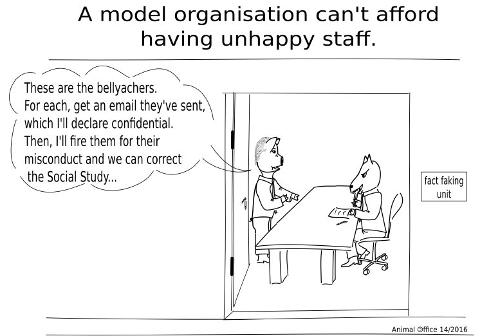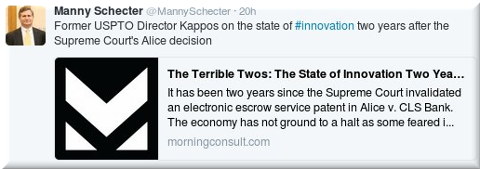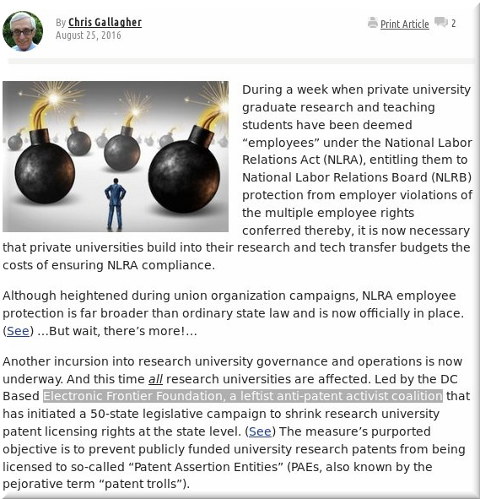08.29.16
Posted in America, Europe, Patents at 1:45 pm by Dr. Roy Schestowitz
…as if anyone with an idea/invention can afford them.

Reference: Let Them Eat Cake
Summary: A reality check regarding software patents and regarding those who truly benefit from an expensive patent system with an even more expensive litigation process/proceedings
THE USPTO is cracking down on software patents. Like TTIP lobbyists, patent lawyers will never publicly admit this. It was the same in Europe while UPC hype was all the rage (before Brexit effectively killed it).
Proponents of software patents seemingly resort to unrelated cases now, such as this patent. It’s about Mayo, not Alice, as it is not a software patent. The patent attorney writes “US Pat 8,586,610, administration of iloperidone; Survived 101/ Mayo Attack,” once again reusing these loaded words (like “attack” and “survive”, even when the “survivor” is the patent aggressor/plaintiff and the “attacker” is actually the defender/victim). Nice reversal of narrative, right? Like George Bush “defending” himself in Iraq and Ukraine “attacking” Russia…
“It was the same in Europe while UPC hype was all the rage (before Brexit effectively killed it).”Elsewhere in today’s news, we learn that “Prescient has received 13 patents on its software,” but software patents are pretty worthless right now. They just get invalided in the courts and the boards (and these are the ones whose holders actually believe have a chance, hence asserting them; the rest — or the untested patents — are likely easier to invalidate once scrutinised/challenged).
A pro-software patents site, Watchtroll, yesterday published this piece by Anthony de Andrade and Venkatesh Viswanath. It’s quite a shot in the foot actually as it serves to legitimise the site’s idealogical opponents. It shows that ‘global’ patents (applied for separately in several jurisdictions) is not for startups but for the richest people (or huge corporations). To get a patent virtually everywhere in the world (where it techncially matters) “an applicant would require $296,233 to file National Phase applications in said jurisdictions and maintain the applications” (renewal fees).
$296,233, eh?
“So much for protecting the ‘little guy’, eh?”For one. Single. Patent!
So much for protecting the ‘little guy’, eh?
This reminds us of Apple’s patents in the EPO — patents which Battistelli is totally clueless about. Remember that Apple is possibly the world’s richest company (by many criteria that are commonly assessed by major publications) and watch what it’s applying for now: “Apple filed for patent on unauthorized user biometric data collection system (AppleInsider) — If an “unauthorized user” (read: thief) uses an iPhone equipped with this technology, the device could capture a photo and fingerprint of the user for use by law enforcement. Not exactly rocket science to understand how this might be used by law enforcement remotely to assure a particular contact (read: target) is in possession of an iPhone, either. Keep an eye on this stuff.”
The Apple advocacy sites offer spin by reinforcing the idea that it’s OK because it will only be used against crime. To quote AppleInsider: “An Apple patent application published on Thursday describes a method of storing an unauthorized user’s biometric information, which can help strengthen security management or assist in device recovery and criminal prosecution in the case of a theft.”
“The Apple advocacy sites offer spin by reinforcing the idea that it’s OK because it will only be used against crime.”“Even as Apple contemplates surveillance software to catch thieves’ fingerprints,” IDG wrote, “it is also reportedly planning to redesign the physical elements of its devices that would make that approach possible.”
As usual, being an Apple story, it was all over the news (we saw more than dozens — perhaps hundreds — of articles, e.g. [1, 2]) and it was all praises and cheerleading, hardly criticism, just like that time Apple patented remote disablement of a phone’s camera (a ‘gentler’ form of kill switch that already exists).
“Apple had to spend a quarter of a million dollars getting a patent on this stupid ‘idea’ in every technologically-developed country, it would just be slush funds to Apple.”It takes sheer disregard for privacy and human rights to do what Apple expresses a desire to do here. It’s not at all innovation, just a lot of hype. If Apple had to spend a quarter of a million dollars getting a patent on this stupid ‘idea’ in every technologically-developed country, it would just be slush funds to Apple. Apple is suing companies (using patents) for billions. What about the mythical ‘little guy’? The patent system just isn’t for the ‘little guy’. Maybe it was a long time ago, but not anymore. See these comments in Reddit, one of which says about patent examiners: “They probably spend a lot more time digging themselves out from under the mountain of Apple / Samsung forms.”
This is, in essence, what the patent systems have turned into. To quote a comment that we mentioned yesterday (regarding the EPO), “Member States must decide very quickly if they wish to throw away more than 40 years of success, and replace it with a system that no longer rewards innovation, but instead becomes simply a tool for large corporations to dominate by means of their financial muscle.” █
Permalink
 Send this to a friend
Send this to a friend
Posted in Deception, Europe, Patents at 12:41 pm by Dr. Roy Schestowitz
Prepare for some EPO propaganda about staff being happy, even when the Organisation admits there is a crisis and the President has a 0% approval rate

Summary: The European Patent Office (EPO) has done absolutely nothing to improve the work atmosphere, it just alters the marketing strategy somewhat
THIS week, while on retreat in Wales, I intend to dive into hundreds of EPO documents. There is a lot of ‘dirty laundry’ in there (plenty of documents), but now isn’t the best time to write about them because not many people — both staff and journalists — will pay attention (many are still on holiday). Don’t let the silence be mistaken for pacification. We expect that Battistelli will misinterpret this silence and predict it won’t take long for the "Social Study" propaganda to come out (they have renamed it and expect to release it in several weeks, surely with journalists to be contacted to play along and spread/embed the EPO's lies).
“It may sound benign, but given the undisputed decline in EPO patent quality, is it worth bragging about?”There’s a similar/analogous situation at WIPO. IP Watch is playing along with WIPO’s PR/face-saving statements [1,2] (see below) today, whereas the EPO keeps rather quiet. In some promotional press releases, low quality control for EPO patents gets ignored and companies brag about intent to grant at the EPO. It may sound benign, but given the undisputed decline in EPO patent quality, is it worth bragging about? How long before the “Battistelli effect” is understood by all applicants?
For the first time in quite a while SUEPO published something today (not just a link). The workers are coming back (those who have not left or retired). “The London-based lawyers, Bretton Woods Law, specialise in the Rule of Law, International Human Rights law and International Administrative Law,” SUEPO explained this morning, sporting two PDFs that we made public a few months ago (these got leaked to us). “At the request of SUEPO, Bretton Woods Law produced a legal opinion concerning the actions of the President of the EPO, and the responsibility of the Administrative Council as well as the Member States of the EPO with respect to staff,” SUEPO continued. “In an Annex to the above document a number of the reforms are considered in the light of basic legal and democratic standards in Europe.”
“Expect September to be a busy month for EPO coverage.”One document is 22 pages long and the latter is 25 pages long. That’s a lot to read. But these are both well written and structured.
The EPO has not had any announcements for a while (other than the earthquake — Italy’s, not Battistelli's — getting exploited). Universities are still 'spammed' by the EPO (new examples in [1, 2], even repeatedly today) and sometimes this pushing truly works, as it comes not only from the EPO to all Twitter ‘followers’. It’s promotion of Battistelli's next lobbying event (if he survives this long at the EPO).
Expect September to be a busy month for EPO coverage. Nothing at all has improved (for many months). In fact, things got worse. Those who wish to send us information can do so securely using anonymity-preserving methods of choice. █
Related/contextual items from the news:
-
Staff dissension? A thing of the past, according to WIPO. Staff are being included and are at the center of everything. And (after a major upheaval, including the firing of the oppositionist Staff Council president in 2014 followed by staff protests outside the building), the report states: “Finally, staff are at the front, left, right and center in organizing elections for a WIPO Staff Council through which, for the first time, all staff members will have the opportunity to exercise their right to vote.”
-
The choice of hosting countries for new WIPO external offices and the Medium Term Strategic Plan 2016-2021 are among the hottest subjects of the week, according to several regional groups speaking at the opening today of the World Intellectual Property Organization Program and Budget Committee. Separately, the United States again called the attention to a 2015 treaty protecting geographical indications which they said should not be automatically administered by WIPO. And members called attention to audit and oversight issues at WIPO.
Permalink
 Send this to a friend
Send this to a friend
08.28.16
Posted in America, Patents at 3:04 am by Dr. Roy Schestowitz
The very home (or origin) of software patents is finally breaking up with them

Summary: A roundup of new articles about software patents in the United States, 2 years into the post-Alice era (the US Supreme Court deeming patents on software too abstract to have merit)
WE are very pleased to see the USPTO (and also GAO) recognising that patent quality truly counts. The EPO under Battistelli treats quality control as a nuisance, which is a terrible mistake. A lot of people publicly acknowledge right now that software patents are somewhat of a “thing of the past”, even if few of these still trickle in past the examiners (later to be properly scrutinised by PTAB and/or the courts, whereupon there’s a reversal). Jakob Schnaidt, writing for MIP, said this: “In the early 1960s, patent practice was quiet and inventors often faced a hostile environment.” Nowadays, by contrast, “patent practices” take over the system (they write patent law by proxy), tax everything, and inventors face a hostile environment full of patent trolls and fear. Which way — or status quo — will we be better off with? Remember that back in the 1960s there was software but no software patents. In fact, back then FOSS (Free/Open Source software) was the norm; people openly shared source code and didn’t keep it secret. It didn’t work too badly, did it? A lot of software innovation happened around that time, arguably more so than today. Magazines used to publish source code (e.g. for compression) and there was no atmosphere of fear over patent lawsuits in the field of software.
“Remember that back in the 1960s there was software but no software patents.”An industry full of (or rife with) patent lawyers is certainly good for “patent practices” but not for developers. An article which was mentioned here before but reposted/revisited by MIP over the weekend compares the situation in Japan to that of the US. “As Suntory and Asahi settle their patent dispute over non-alcoholic beer,” says the summary, “John A Tessensohn surveys the state of litigation in Japan, and compares it with the United States” (spoiler alert: there’s a paywall).
Japan is arguably the only country in which software patents are potent, other than the United States (which is moving away from them anyway). There are a few other east Asian countries where software patents stand a chance, but then again, quality control there is virtually non-existent. Consider SIPO in China for instance…
Looking at some recent patent news from the US, Cioffi, which was mentioned here before, uses software patents against Google. Cioffi does this in the Eastern District of Texas, the capital of patent trolls where courts advertise themselves as plaintiff-friendly. The US Supreme Court might eventually weigh in (latest reports on the case suggest that the software patents might somehow reach SCOTUS), potentially reaffirming its position on Alice. As one writer put it: “Central to the decision was the court’s interpretation of two of the claims that Cioffi had made in the patents pertaining to a “web browser process” and a “critical file.” While Cioffi’s lawyers maintained that the terms as defined in the claim were narrow and specific in scope, Google argued that there were no common definitions for these terms on which to base an infringement claim.”
After Alice these patents are not likely to survive. Cioffi is wasting its time and money and once it leaves the crooked courts of the Eastern District of Texas it doesn’t stand a chance. These patents are far too abstract and broad, as Google already points out.
“Sadly for lawyers, in order to win cases they need to do more than just call patents “medical” or “health” (to convince judges).”Revisiting MIP, there are a couple of new articles about PTAB’s fourth anniversary [1, 2]. “Covered business method (CBM) proceedings have lost some of their appeal recently,” says one article. The same goes for software patents and “two recent interesting ITC decisions involving PTAB proceedings,” as the latter article puts it, further reaffirming this (see the statistics presented/charted in the pages). The ITC‘s rejections of software (or abstract) patents were covered here very recently in relation to two cases, not just one. There’s almost no hope left for software patents in the US and vocal patent law firms are fuming. Watchtroll, for instance, is now resorting to ‘medi-washing’ (see “life-saving results” in the headline) of software patents, in an order to make it sound as though if the US doesn’t grant software patents, people will die! These truly pathetic tricks that exploit a perceived dilemma over life — a sort of hostage situation or ransom — just come to show how low Watchtroll would stoop (recall how he mocked PTAB a month ago). As we saw at the EPO’s appeal boards, calling software "device" or "medical" does not make the software patentable. And speaking of software patents on something “medical”, here is a new article titled “What have we learned from four years of digital health patent fights?”
“In 2012,” notes the author, “CardioNet sued several companies, including heart-monitoring company MedTel for allegedly infringing five patents by either selling devices or offering cardiac monitoring services using CardioNet’s software.”
We wrote about this case one year ago (“Healthwashing Patents”). Sadly for lawyers, in order to win cases they need to do more than just call patents “medical” or “health” (to convince judges). As this article notes, even Intellectual Ventures does not bother with the strategy. To quote: “The biggest of these NPEs, Intellectual Ventures, hasn’t filed a single suit in the mobile health space according to the firm’s website, though it has litigated aggressively in the telecom and digital camera spaces since 2012.”
“It’s only now, decades too late, that the US Congress, GAO, courts, ITC, PTAB and even the USPTO (however begrudgingly) acknowledge this was a mistake all along.”Yes, the Microsoft-connected Intellectual Ventures even went after Linux with such patents, as we showed earlier this year and last year. Finally, notes this article, Alice changed everything. To quote: “The judges in those two cases cited a Supreme Court precedent, Alice v CSL Bank. Much older precedents have created a category of inventions that are unpatentable because they constitute an “abstract idea”. Under Alice, a 2014 unanimous decision, the Supreme Court devised a test for whether computer software was a patentable invention or just the application of technology to an unpatentable human process, and therefore an unpatentable abstract idea. Both American Well and Jawbone failed that test.”
Patent law firms will tell us that this is bad news (for “innovation” of course!); so will officials-turned-lobbyists like David Kappos. But the reality is, such patents should never have been granted at all. It’s only now, decades too late, that the US Congress, GAO, courts, ITC, PTAB and even the USPTO (however begrudgingly) acknowledge this was a mistake all along. Better fix the system; better late than never. █
Permalink
 Send this to a friend
Send this to a friend
Posted in Europe, Patents at 1:58 am by Dr. Roy Schestowitz
“The Member States must decide very quickly if they wish to throw away more than 40 years of success, and replace it with a system that no longer rewards innovation, but instead becomes simply a tool for large corporations to dominate by means of their financial muscle.”

Summary: The European Patent Office (EPO), collectively speaking, is still wrestling with a Battistelli infiltration (a circle of high-level managers) which habitually lies and viciously attacks those who dare counter these lies
MANAGEMENT of the EPO is a disaster and the cause of crisis. It has been doing far too much damage to be simply tolerated and taken for granted. More than 2 years since we began coverage of some of the cliquish scandals Battistelli is still in power (having merely broadened his ‘circle’) and his agenda, except the UPC, is still moving forward. Software patents in Europe will be promoted next month in New York [1, 2] because who cares about the EPC, right? These people don’t seem to care about patent quality, not even when the US is itself withdrawing or moving away from software patents (post-Alice). It often seems like the USPTO quickly redeems itself, whereas the EPO goes (or races) in the opposite direction under Battistelli. Have we learned nothing from the mistakes of David Kappos, who is publicly accused this weekend of discarding patent quality?
 The EPO has been rather silent for several weeks, probably more so than last year (in spite of summer holidays). It can be seen messaging everyone with dull repetition but slight variation (as if from a set of templates) [1, 2, 3] regarding Battistelli’s next lobbying event. The EPO is now 'spamming' the University of Manchester too (it ‘spams’ quite a few universities to jack up the votes/nominations, e.g. [1, 2, 3, 4]). Apart from that, there’s nothing which counts as news, just a lot of repetition. The UPC is on the rocks, so there’s nothing to be celebrated. According to this report titled “U.K. Patent Bar Says Country Should Join EU Patent Court” (via), Team UPC has grown rather desperate as short of political mischief the UPC cannot happen in the UK (or anywhere in Europe unless profoundly overhauled). Still, these people are pushing Lucy to ratify the UPC for their own personal gain. This takeover by non-practicing elements led Henrion to stating (to one from Team UPC, his employer) that “upc is not a reform, it is n hostile takeover.” It’s a Battistelli-backed takeover. It would be valuable for large corporations from abroad, not to mention patent trolls from the US.
The EPO has been rather silent for several weeks, probably more so than last year (in spite of summer holidays). It can be seen messaging everyone with dull repetition but slight variation (as if from a set of templates) [1, 2, 3] regarding Battistelli’s next lobbying event. The EPO is now 'spamming' the University of Manchester too (it ‘spams’ quite a few universities to jack up the votes/nominations, e.g. [1, 2, 3, 4]). Apart from that, there’s nothing which counts as news, just a lot of repetition. The UPC is on the rocks, so there’s nothing to be celebrated. According to this report titled “U.K. Patent Bar Says Country Should Join EU Patent Court” (via), Team UPC has grown rather desperate as short of political mischief the UPC cannot happen in the UK (or anywhere in Europe unless profoundly overhauled). Still, these people are pushing Lucy to ratify the UPC for their own personal gain. This takeover by non-practicing elements led Henrion to stating (to one from Team UPC, his employer) that “upc is not a reform, it is n hostile takeover.” It’s a Battistelli-backed takeover. It would be valuable for large corporations from abroad, not to mention patent trolls from the US.
“Well, the lies of Battistelli are very common and very frequent.”As we already noted here years ago, the UPC would likely make the boards of appeal redundant and despite the fallout (post-Brexit) Battistelli is still punishing the boards. It speaks volumes about his horrible sense of leadership. Responding to an article from the Journal of Intellectual Property Law and Practice, one person in the comments section now notes that Battistelli “has instructed staff to provide preferential treatment to such mega corporations,” as per leaks we published here a year ago. Here is the full comment:
It is encouraging to see a critique of the current situation at the EPO, but it focusses on the situation of the Boards of Appeal, without going into enough detail about the staff conflict, which has major repercussions for the mission of the EPO. The editorial seems to accept that there was a need for “reform” without saying what reform and why. Once on accepts the use of this term, much wielded by the President, it is a very short step to considering it a “good thing”, and that the only difficulty lies in its implementation. This is very far from the truth. The President’s aims since his appointment seem to be to replace the high- standard examination at the EPO, which has contributed so much to the its reputation, and to the rewarding of innovation by small and medium industries, with a registration system, such as prevails in France, which favours mega corporations with deep pockets for litigation. To this end he has instructed staff to provide preferential treatment to such mega corporations, made impossible productivity demands on examiners, and appears to be intent on destroying the Boards of Appeal. The editorial is correct in identifying the weakness of the governance of the EPO by those who benefit financially from it. The President has had no hesitation in exploiting that fact, linking grants to agreement with his agenda, promising that the EPO will pay for “emergency” dental treatment for delegates at AC meetings, etc. In fact he realized from the outset that the only real opposition he was likely to encounter was from the staff, and specifically, the staff union, SUEPO. The resistance of the staff is not linked to salaries and benefits, but rather to the idea that with privilege comes responsibility, and with pride in fulfilling that responsibility by providing a high standard of examination to the benefit of industry. Hence the President has specifically targetted the union, and the staff with a series of repressive measures that would be impossible in any member state, secure in the knowledge that, as the editorial correctly states, staff have little or no recourse to timely justice. He has dismissed or demoted Union officials on trumped-up charges, forbidden strikes, rigged the internal system of appeals, and done away with almost all of the feeble safeguards available to staff. Indeed the ATILO itself has expressed extreme disquiet at the overwhelming workload generated, to the extent that it is threatening to expel the EPO.
The editorial is right to say that something must be done. A reputation is built over many years, but can be destroyed quickly and is slow to be recovered. Already experienced staff are leaving in droves, and recruitment criteria are being greatly lowered. The Member States must decide very quickly if they wish to throw away more than 40 years of success, and replace it with a system that no longer rewards innovation, but instead becomes simply a tool for large corporations to dominate by means of their financial muscle.
As long as Battistelli demolishes patent quality at the EPO there is an uncertain future for the Office. NPOs (national patent offices) might turn out to be the better route in all cases, thus jeopardising everything that the EPC stood for. In the EPO’s own words (a couple of days ago): “To get protection in just a few countries, applying for national patents may be best” (under Battistelli it may be best under all circumstances).
Another comment said: “In the Administrative Council every member-state has the same level of voting power. One possible solution might be that there will be a different weight added to the vote of a member-state.” As readers may recall, the EPO’s President is rumoured to be ‘buying’ votes of small countries. He is also lying to Administrative Council delegates in order for them to support his unpopular proposals, including the crushing of the appeal boards.
In light of the recent coverage from Bernhard Lohr (not Katja Riedel or other colleagues), as well as an article about Haar for which a translation is still needed, one person published the following comment:
From the text of the reform concerning the relocation of the boards:
“in Germany, it was decided to separate the former boards of appeal administratively and physically from the German Patent and Trademark Office, as the new Federal Patent Court, in order to reinforce their independence.”
Actually, the trade mark department of the DPMA is in the same building as the Bundespatentgericht.
It is surprising that at least the German representative in the AC did not point out this lie of Battistelli. May be he will get a post as vice president or as the president of the boards in the near future.
Well, the lies of Battistelli are very common and very frequent. We pointed out some lies of his just a few days ago. Those who have the courage to question him and his lies are punished severely, so the record is rarely corrected from within. From September onwards we plan to accelerate coverage of the EPO. There is still a lot of ‘dirty laundry’ or skeletons in Battistelli’s closet. █
Permalink
 Send this to a friend
Send this to a friend
08.26.16
Posted in America, IBM, Patents at 2:54 pm by Dr. Roy Schestowitz
How shallow, spotted just hours after publication by Kappos

Manny Schecter works for IBM, the former employer of Kappos
Summary: Responses to the latest call against Alice (eliminator of many software patents), courtesy of the man from IBM (still paid by IBM) who was responsible for the policy that blindly approved a lot of software patents in the US
Our latest article about David Kappos (who has in essence been helping Microsoft's extortion of Linux using low-quality patents in large numbers) was well received by quite a few people. They know a lot better now what Kappos stands for and who pays him. Our many articles on the subject contributed to that. Interest groups and lobbyists are among the things we have been exposing for nearly a decade. Once exposed, they are a lot less capable of operating. Sometimes they need to rename.
As Henrion put it/told Manny Schecter (IBM), “he [Kappos] is a Microsoft/Apple spokesman.” He is also a former IBM employee who is now being paid by IBM for his lobbying.
This article from Kappos led to an article by Mike Masnick (via Professor James Bessen) shortly after we had mentioned it. Masnick said that “of course, if you’re former US Patent and Trademark Office boss David Kappos — who presided over a massive increase in patenting, which the Government Accountability Office recently noted was mainly due to basically no quality standards being used — this is a bad thing. Perhaps he takes it personally that the current patent situation really puts an exclamation point on the fact that he helped usher in hundreds of thousands of anti-innovation weapons that could be used to shake down actual innovators.”
Like the Battistelli-led EPO right now? AntiSoftwarePat highlights the part of the above article which says Kappos “presided over a massive increase in patenting… mainly due to basically no quality standards being used” (i.e. rubberstamping, with approval rates soaring). █
Permalink
 Send this to a friend
Send this to a friend
Posted in Deception, EFF, Patents at 2:28 pm by Dr. Roy Schestowitz
Black or white: either you’re a patent maximalist or you are “anti-patents” (or “anti-patent” as Watchtroll puts it, see below)

Summary: Like IAM, which tries to portray sceptics and critics of software patents as “anti-patents”, IP Watchdog (or Watchtroll as we call it) is ‘trolling’ the Electronic Frontier Foundation, simply because it expressed an opinion that patent maximalists cannot tolerate
Watchtroll’s site, being the usual loud-mouthed proponent of software patents (sometimes even very rude), responded to a topic on which we commented this morning. Daniel Nazer (EFF) noticed that this “New IP Watchdog post [is] slamming “DC Based Electronic Frontier Foundation, a leftist anti-patent activist coalition”” (it’s not anti-patent, it is pro-patent quality, as are we).
Here is the relevant passage from the post: “Another incursion into research university governance and operations is now underway. And this time all research universities are affected. Led by the DC Based Electronic Frontier Foundation, a leftist anti-patent activist coalition that has initiated a 50-state legislative campaign to shrink research university patent licensing rights at the state level. (See) The measure’s purported objective is to prevent publicly funded university research patents from being licensed to so-called “Patent Assertion Entities” (PAEs, also known by the pejorative term “patent trolls”).”
Like IAM's editor in chief, they are also in denial about the trolls problem, just like people who are in denial about climate change (because this reality, once realised by the public, is a threat to one’s business).
The OSI took note and wrote about my article via Former OSI Dir. Jim Jagielski who wrote: “Shows the danger of s/w patents… is it time to finally squash them once and for all?”
Carlo Piana, a famous lawyer for Samba and generally a very nice intellectual (against software patents) wrote on Friday: Has anybody, ever, read a #patent on software without thinking “WTF”? Honestly. And now I have read like 100 of them. And I’m no developer.”
Benjamin Henrion (FFII) responded: “the state urgently needs to intervene between me and my keyboard to save innovation!”
The matter of fact here is clear; anyone with a keyboard and some rudimentary coding skills is affected by software patents and the population in general suffers from slowed innovation and artificially increased prices (often due to lawyers’ fees and patent trolls if not billionaire patent bullies such as Microsoft and Apple). We wrote about it this morning. █
Permalink
 Send this to a friend
Send this to a friend
Posted in America, Apple, Courtroom, Europe, Microsoft, Patents, Samsung at 7:55 am by Dr. Roy Schestowitz
Quality of patents causes markets to prosper or contrariwise perish

Giving aggressors like Microsoft sacks of patents to breed Mafia-like behaviour, not healthy competition
Summary: Revisiting the EPO’s vision of poor patent examination and the effect of discriminatory granting practices, favouring patent bullies such as Microsoft (which actively attacks Linux using low-quality and usually pure software patents)
“A skilled patent attorney working with a qualified searcher could cobble together a colorable obviousness argument against the vast majority of issued patent claims,” says a new article from Patently-O. Not to mention “abstract” criteria, prior art and so on. “Part of the difficulty for patentees,” continues the article, “stem from the the billions of prior art references available via increasingly effective search tools. Even when an invention results from a ‘flash of genius,’ patent law typically back-fills extensive knowledge for the obviousness analysis – even when that knowledge was not actually available at the time of the invention. The larger difficulty though is likely the large number of hard-to-pin-down facts such as the motivations, common sense, and level of creativity of a person having ordinary skill in the art.”
“In the case of large companies like Microsoft, mountains of patents (granted in bulk by the EPO]) can be used to compel companies to pay up without even a trial.”If the EPO replaces examiners with algorithms, things will exacerbate further and patents get granted incorrectly, leading to an ocean of frivolous lawsuits. In the case of large companies like Microsoft, mountains of patents (granted in bulk by the EPO) can be used to compel companies to pay up without even a trial. Recall the Microsoft v TomTom case. Picking on small companies is Microsoft’s thing; it doesn’t sue Google.
The above reminds us of the danger of poor patent quality as well as streamlining grants, which is what Battistelli’s EPO has in effect done for Microsoft (and evidence we showed for that led to legal threats from the EPO). They — like the USPTO — in effect facilitate patent racketeering by Microsoft.
“They — like the USPTO — in effect facilitate patent racketeering by Microsoft.”Watch this new article titled “Primetime: Microsoft’s Android Cross Patent Dealings”. That’s misleading because it's not cross-licensing, it's a patent settlement (in bundling form) and it’s essentially a patent shakedown without even a trial and without an opportunity to properly assess the quality (and thus in/validity) of patents. The article says that “to press on this advantage, Microsoft does need to sign into more cross licensing or similar patent deals with manufacturers. Given Microsoft’s patent portfolio and how useful this will be to those manufacturers wishing to break into the North American market, such as Xiaomi, we may be seeing more of these arrangements in the coming months. The alternative might be Microsoft suing any manufacturer that tries to sell devices into a patent-friendly market.”
But again, these are not cross-licensing deals, these are patent shakedowns. One might even call this extortion or racketeering, even though Microsoft is too well-connected to face court charges brought forth by the government.
It is worth noting that many of Microsoft’s patents — those which it uses to shake down Android players (OEMs) — are not even valid anymore (if properly scrutinised), but there are so many of them that it would cost a fortune to demonstrate it to the court. It’s a numbers game, quantity rather than quality. It’s cheaper to just settle and let Microsoft continue to wield software patents like a weapon, even post-Alice. PTAB cannot take a request to review hundreds of patents from just one single company because it’s already overburdened by a growing number of reviews (IPRs).
Speaking of patent aggressors, there is this new software patent from Facebook (the usual, see our Facebook wiki page). These are oftentimes surveillance patents, but this time is’s about languages, at a time of increased competition with Google. Facebook's growing stockpile of patents is a real problem (Facebook has a history of going aggressive with them) and The Next Web says that “the US patent office issued 6,789 patents. Each patent adds a little something new to the human knowledge base. As we cannot list all six thousand, the PatentYogi team has selected the five most interesting patents.” How many of these are software patents that oughtn’t have been granted? How many of these will be toothless some time in the near future?
Patently-O says “The number of pending Ex Parte appeals continue to drop. Great work PTO.” There are other statistics of interest, based on PDFs from the USPTO (like this one). Patently-O claims they suggest that: “Design patent applications expected to reach 40,000 for FY2016 – up from under 30,000 in FY2010. The PTO is working to improve design patent prosecution speed – current wait of more than a year for a first office action.”
Well, the Office may have granted 40,000 patents on designs, but once reassessed the Office may need to throw them all away, on a per-request basis (post-Apple v Samsung at SCOTUS). Granting again for the sake of granting? Until the next Alice happens?
Patent quality control is the principal pillar of true and potent patent offices, otherwise they would be just archives of untested claims (a registration/filing system). █
Permalink
 Send this to a friend
Send this to a friend
Posted in Europe, Patents at 6:59 am by Dr. Roy Schestowitz
In the pockets of the patent microcosm

Summary: Benjamin Henrion (FFII) on seeing the EPO alongside patent trolls and other nefarious actors, doing what they do best, which is undermining public interests and harming patent quality
“PUBLIC SERVANTS” has become misnomer for EPO officials. Consider the EPO‘s Francesco Zaccà, whom we first mentioned in this leak about "Closer Contact with Major Applicants" (with special ties to Qualcomm and Ericsson in his case). Benjamin Henrion drew attention to this recent talk, showing even the patent troll Sisvel at this recent event, which included Zaccà.
From the page in question: “The panel chaired by Francisco Mingorance, IP Europe, stressed the importance of innovation protection as a growth factor. Pasquale Marasco, head of ICT Innovation Pole at Torino Wireless Foundation, highlighted the SME’s stakes and concerns, as Matteo Sabattini, Sisvel CTO, reinforced the message detailing Sisvel’s example. Francesco Zaccà, Director in ICT of EPO, echoed the keynote address and said that «the main goal of the patent system is to protect innovation, to enable the innovation circle from protecting the invention, securing remuneration and re-investing in research. Yet, every challenge is a new opportunity for combining standards with open sources, and patents with protection». His opening statement «we are here to support innovation» fired up the crowd.”
“Francesco Zaccà, speaking for the EPO, is quoted or paraphrased as saying that every challenge is a new opportunity for combining standards with open sources, and patents with protection.”Francesco Zaccà, speaking for the EPO, is quoted or paraphrased as saying that every challenge is a new opportunity for combining standards with open sources, and patents with protection. What an odd thing to say. This sure sounds like the FRAND loophole for software patents in Europe. Not good…
Francisco Mingorance, now in IP Europe, is a former software patents lobbyist from the Business Software Alliance (BSA), a Microsoft front group which spent years lobbying for software patents in Europe (FRAND was one loophole they attempted to interject). Mingorance now chairs a panel with Zaccà in it. His employer, IP Europe, is a front for the patent microcosm and Henrion describes them, based on their words, as “Accelerating the entry into force of the Unified Patent Court (UPC Agreement): more trolling powers http://www.iptalks.eu/”
“They’re supposed to be focused on patent examination, not lobbying and lawmaking.”Some people still act as though the UPC will become a reality. It probably never will. It’s zombie legislation like ACTA, but the patent microcosm still wants us to believe there will be UPC after Brexit. It’s that old self-fulfilling prophecy method and they really ought to just give it all up. Found via this tweet was a Team UPC blog post the UPC “post-Brexit” (it would probably have to be rewritten and renamed to have any chance at all).
Thomas F. Cotter, a law professor from the US, more recently referred to a “paper in the June 2016 issue of GRUR Int (pp. 513-30) titled Schadensersatz und Einheitspatentsystem: Rechtliche Grundlagen und Systematik des Schadensersatzanspruchs im künftigen Einheitspatentsystem (“Damages and Unitary Patent System: Legal Principles and Schematic of Damages Claims in the Future Unitary Patent System”).”
According to him, this “article notes, among other things, that article 68(4) of the Agreement on a Unified Patent Court appears to permit a court to award the infringer’s profits without evidence that the infringer knew or should have known of the patent (in contrast to German law). Towards the end of the article, the author also questions whether the Agreement contemplates anything comparable to the German practice of permitting a court to award damages in its free discretion (nach freier Überzeugung) under article 287 of the German Civil Procedure Code (see my recent article on Patent Damages Heuristics at p.20 & n.76 for brief discussion). My one critique of the article is that it doesn’t take account of the change made in the 17th and 18th drafts of the UPC Rules of Procedure, which in a departure from the 16th draft have eliminated the provision (article 118(2)) that would have allowed the court to award damages in lieu of injunctive relief (see discussion on this blog here). Overall, though, a good read.”
“People who believe that the UPC will become a reality some very time soon are truly out of touch, much like Battistelli and his circle of ‘loyals’.”The patent microcosm (which dominates Team UPC) wants the UPC for more lawsuits, more/higher damages, and a generally litigious atmosphere that brings them more business. It’s truly a shame that EPO staff, including Zaccà’s colleagues, are openly promoting it at events (as Philpott did last year). What credibility will they have left? They’re supposed to be focused on patent examination, not lobbying and lawmaking.
Found via this tweet was yet more promotion of the UPC, courtesy of Team UPC again. “Unitary Patent reforms are welcome, even though patent litigation in Europe has worked quite well” says the headline and Francisco Moreno, a critic of the UPC, uses the hashtags #UPCbelievers and #PrayForTheUPC (sarcasm) in relation to what Tufty Sylvestris wrote about the above: “Another Remainer disappointed about the effect of #Brexit on the UPC, but still hopeful (or in denial).”
People who believe that the UPC will become a reality some very time soon are truly out of touch, much like Battistelli and his circle of ‘loyals’. Maybe they too should quit embarrassing themselves and work on fixing the EPO. Pushing towards software patents in Europe (directly or indirectly) is just about the dumbest thing they can do. █
Permalink
 Send this to a friend
Send this to a friend
« Previous Page — « Previous entries « Previous Page · Next Page » Next entries » — Next Page »





 The EPO has been rather silent for several weeks, probably more so than last year (in spite of summer holidays). It can be seen messaging everyone with dull repetition but slight variation (as if from a set of templates) [
The EPO has been rather silent for several weeks, probably more so than last year (in spite of summer holidays). It can be seen messaging everyone with dull repetition but slight variation (as if from a set of templates) [



















 Content is available under CC-BY-SA
Content is available under CC-BY-SA